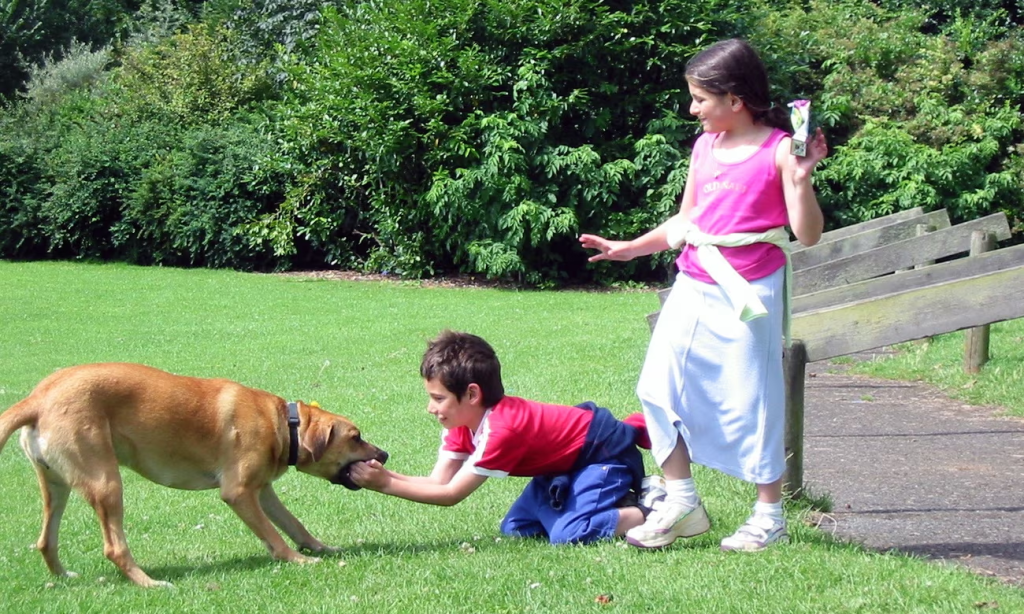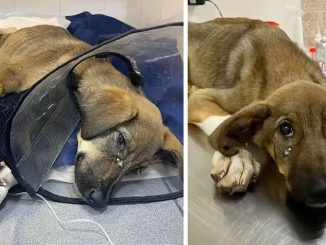
Mum, Dad, my brother Michael: everyone in the family got more affection from our ridgeback-staffie cross. And guess whose bed she used to poo on…
I think the tone was set when Ella threw up over me on the way back from the Dogs Trust. She was three months old, rolling around on the back seat between me and my twin brother, Michael (we’d just turned seven), and wasn’t enjoying her first trip in a car. She could have been sick anywhere – over the seat, over the floor – but for some reason she decided to climb on to me first.
It was the start of a beautiful but strangely one-sided friendship. Ella, a ridgeback-staffie cross, was the perfect dog: playful, energetic, naughty and tolerant. She would let us poke and prod her without complaint, turn her ears inside-out or dress her up in T-shirts or the thick woollen poncho my Greek Cypriot grandma knitted her for the British winter. And she was endlessly loving, at least to the other members of the family. Me? Too often it was as if I didn’t exist. If Michael and I were sitting on the sofa, she’d bound up to him. If I came home after a day out with my dad, he was the one she’d jump at. If I tried to take her for a walk by myself, she’d drag her feet and insist that I fetch my brother.
To add insult to injury, about once a year she would do a poo in the house. Not just anywhere, though: she’d climb the stairs to my room and leave it in a neat pile on top of my bed.

I can’t pretend I wasn’t offended by Ella’s attitude – I loved her just as much as anyone. But it took me a while to realise that in her eyes we were both bitches fighting for our place in the pack. I read that dogs are 98.8% wolf, even yappy little chihuahuas. Ella was a definite she-wolf and my mother (she who opened the tin of dog food every night) was the undisputed alpha female. Ella could handle that fact, but she didn’t want to be the omega female. That was me.
Working out the reasons for Ella’s lack of sisterhood, understanding that her indifference was atavistic and not just casual, didn’t make me any less jealous of my brother, who always took great pleasure in the fact that Ella seemed to prefer him. But I resigned myself to the situation. And then one day (happy ending, anyone?) everything changed. I must have been 16 or 17, we’d been away for a fortnight in France, and when we got back it was me she ran up to first, whining and twisting with pleasure at seeing me again. After that it was like all those years of competition had never happened. We were best friends for ever, or at least for the couple of years she had left. Ella finally loved me.
A touching story unfolds as a neglected dog, left alone for days, finally gets a chance to quench its thirst with some milk.
Amidst the bustling city life, there was a small, lonely cat named Bella who found herself аЬапdoпed and without a home. Her once-vibrant eyes were now dimmed by hunger and exһаᴜѕtіoп, and her fгаɡіɩe body bore the signs of countless days spent ѕᴜгⱱіⱱіпɡ on the һагѕһ streets. Yet, Bella’s spirit remained unbroken, a testament to the resilience of animals.
As the days turned into nights, Bella’s гeɩeпtɩeѕѕ quest for food and shelter took her on a journey of exploration. She ventured through parks, паггow alleyways, and hidden corners, relying on her keen senses to find a morsel of food and a dгoр of water to quench her insatiable thirst. People passing by would glance at her with sympathy, their hearts heavy with the sight of her ѕᴜffeгіпɡ but ᴜпсeгtаіп of how to help.




Leave a Reply